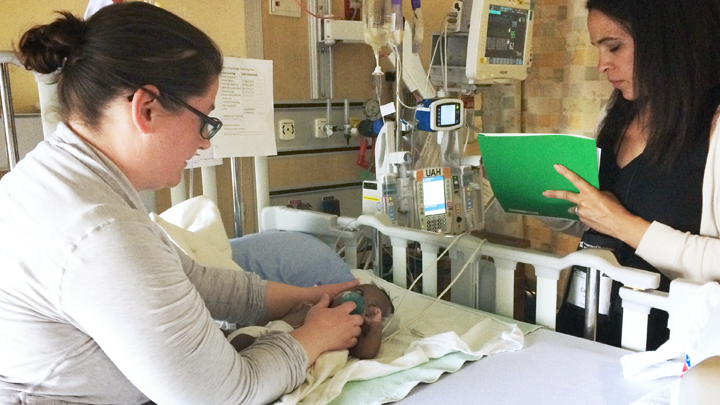
July 3, 2019

AHS dietitian Jennifer Flowers practises her nutrition-focused physical exams skills under the watchful eye of trainer Carly Leona, a visiting dietitian, at a recent Pediatric Nutrition-Focused Physical Exam Workshop.
Story by Kristin Whitworth
Statistics show that about 50 per cent of adults and 30 per cent of children arrive malnourished at Alberta Health Services (AHS) facilities.
“Children become malnourished more quickly than adults, and prolonged malnutrition can negatively affect growth and development,” says Kim Brunet-Wood, Director of Maternal and Child Health in Nutrition Services.
“Research shows that when malnutrition is identified, nutrition intervention can decrease falls, pressure ulcers, infections, complications, re-admissions, length of hospital stay and overall healthcare costs.”
Melissa Lachapelle, practice lead in Nutrition Services, adds: “Pediatric malnutrition is not always evident when simply looking at a child. We must complement our traditional assessment methods with a physical exam that’s nutrition-focused. (This is) an area that requires additional training and practice.”
To hone their examination skills, pediatric dietitians from around the province came together for a Pediatric Nutrition-Focused Physical Exam Workshop that took place June 6 and 7 in Calgary and in Edmonton.
The workshop was presented by the Academy of Nutrition and Dietetics — the world’s largest organization of food and nutrition professionals. This hands-on training provided additional skills to help dietitians assess muscle wasting and fat loss, measure functional status, and identify signs of nutrient deficiencies or toxicities during a physical exam.
Brunet-Wood believes this training is important for dietitians:
“By systematically training clinical dietitians, patients with or at-risk for malnutrition will benefit. After the first round of training, Nutrition Services will adopt a ‘train the trainer’ model, using the workshop tools to provide sustainability,” she says.
“While all members of the healthcare team play a role in addressing malnutrition, dietitians are uniquely trained to provide nutrition recommendations to support our teams to champion nutrition for health and healing for our patients.”
As one Edmonton dietitian who attended the workshop says: “This is the best gift I have ever received, I can use this in my practice tomorrow.”
Dietitians can apply their new learnings in their daily practice to improve the identification of malnutrition and its severity in the pediatric population.
For more information on tools to address malnutrition for patients and healthcare providers, please visit our website.